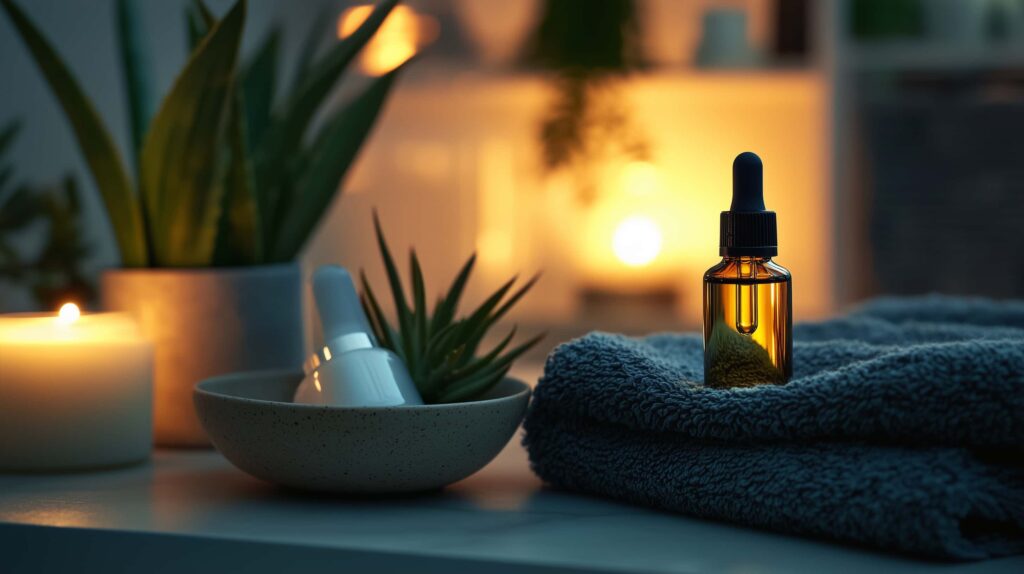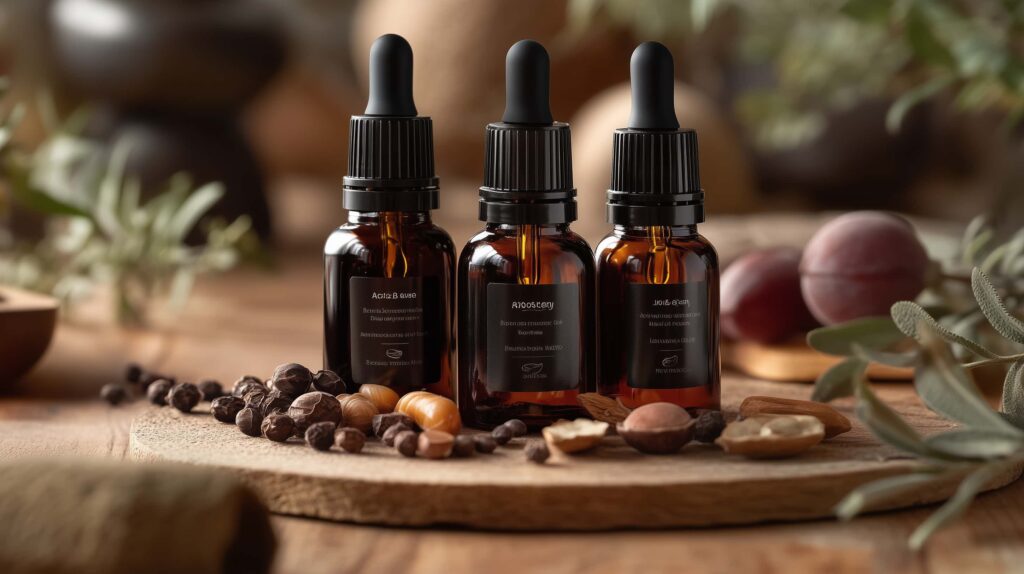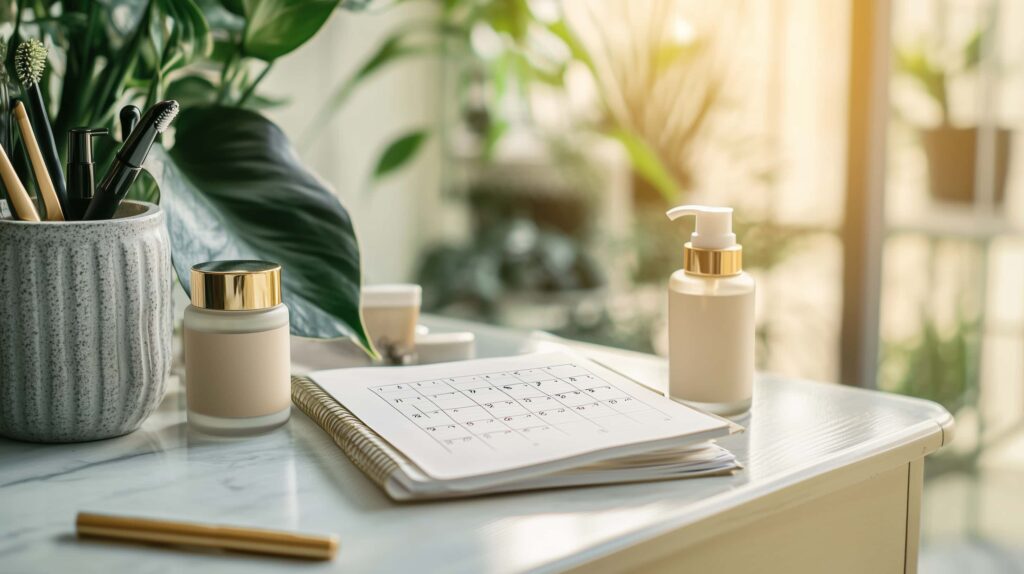Oil 101: Argan, Jojoba, Rosehip for All Skin Types
Welcome to a world where natural oils offer a bounty of benefits for every skin type. Argan, Jojoba, and Rosehip oils stand out as nature’s solution to common skin concerns. Whether you’re battling oily skin or seeking relief for dry skin, these oils provide effective, natural remedies. Their versatility means they can be integrated into any skincare routine, offering hydration, balance, and rejuvenation.
In the coming sections, we’ll dive deep into each of these remarkable oils. You’ll discover the unique benefits of Argan oil for hydration and anti-aging, how Jojoba oil can regulate sebum production and moisturize, and the ways Rosehip oil enhances skin health with its rich nutrient profile. Get ready to learn how to harness these oils for radiant, healthy skin.
Understanding Your Skin Type

Identifying your skin type is the first step towards a tailored skincare routine. Skin types range from oily, dry, combination, to sensitive, and normal. Oily skin appears shiny and may have larger pores, while dry skin feels tight and may flake. Combination skin features both oily and dry areas, typically oily in the T-zone (forehead, nose, and chin) and dry on the cheeks. Sensitive skin reacts easily to products or environmental factors, and normal skin is well-balanced, without persistent issues.
To determine your skin type, wash your face with a gentle cleanser and wait an hour. If your skin shines all over, you likely have oily skin. If it feels tight or looks flaky, you have dry skin. Observing both? You’re in the combination category. No noticeable shine or tightness suggests normal skin, while redness or irritation after using products indicates sensitivity. Recognizing your skin type helps in choosing the right oils for optimal results.
Choosing the right oil based on your skin type is crucial. Argan, Jojoba, and Rosehip oils offer unique benefits for different skin concerns, but their effectiveness depends on how well they match your skin’s needs. For instance, Jojoba oil mimics the skin’s natural oils, making it perfect for balancing oily skin, while Argan oil is a boon for dry skin with its hydrating properties. Understanding your skin type ensures you get the most out of these natural oils.
The Benefits of Argan Oil for Your Skin

Argan oil, often called ‘liquid gold’, is prized for its nourishing benefits. Rich in vitamin E and essential fatty acids, it provides deep hydration for dry skin, while its balancing properties help regulate oil production in oily skin. Its antioxidants also soothe sensitive skin and offer anti-aging benefits, reducing the appearance of fine lines and wrinkles. Its multifunctionality makes Argan oil a versatile addition to any skincare routine.
For those struggling with dry skin, Argan oil is a saviour, offering intense moisture without leaving a greasy residue. Its ability to balance oily skin is another plus, helping to reduce breakouts by regulating sebum production. Argan oil’s soothing properties are a relief for sensitive skin, reducing redness and irritation. Its antioxidant content also fights aging signs, promoting a youthful glow.
Argan oil’s versatility extends to its various uses. It can be applied directly to the skin as a moisturizer, added to face masks for extra hydration, or used as a serum to target specific concerns like aging or dryness. Its light texture makes it suitable for both day and night use, absorbing quickly to nourish the skin deeply.
Incorporating Argan oil into your skincare routine can transform your skin. Its benefits cater to all skin types, making it a must-have in your beauty arsenal. Whether you’re looking to hydrate dry skin, balance oily skin, soothe sensitivity, or combat aging, Argan oil offers a natural, effective solution.
How to Use Argan Oil in Your Skincare Routine

Integrating Argan oil into your daily skincare routine is simple. Start by cleansing your face to remove any impurities. Then, while your skin is still damp, apply a few drops of Argan oil, gently massaging it in with upward motions. This helps the oil absorb more effectively, locking in moisture for hydrated, glowing skin.
Argan oil can also be used as a serum. After cleansing, apply a few drops before your moisturizer to target specific concerns like dryness or aging. Its high concentration of nutrients means a little goes a long way in providing deep nourishment. For an extra hydrating boost, add a few drops of Argan oil to your face mask or overnight cream, allowing it to work its magic while you sleep.
Experimenting with the amount and frequency of Argan oil use will help you find the perfect balance for your skin type. Start with a small amount once a day, adjusting as needed. Dry skin may benefit from twice-daily applications, while oily skin might prefer a lighter application once a day or every other day.
Remember, consistency is key to seeing the benefits of Argan oil. With regular use, you’ll notice improved hydration, balance, and a reduction in signs of aging. Embrace the natural goodness of Argan oil and watch your skin transform.
Jojoba Oil: A Versatile Solution for Every Skin Type

Jojoba oil is a powerhouse in the world of skin care, closely mimicking the skin’s natural sebum. This unique property makes it incredibly effective in regulating oil production for those with oily skin, while its moisturizing benefits are a godsend for dry skin. Its gentle nature also makes it suitable for sensitive skin, reducing inflammation and irritation without clogging pores, thanks to its non-comedogenic nature.
Its versatility doesn’t stop there. Jojoba oil is also a champion for acne-prone skin. By balancing the skin’s natural oils, it helps prevent the overproduction of sebum that can lead to breakouts. Its antibacterial properties further protect the skin from infection, making it a holistic solution for maintaining clear, healthy skin.
For dry skin, Jojoba oil acts as a barrier, locking in moisture and preventing water loss. This keeps the skin hydrated and plump, reducing the appearance of fine lines and promoting a radiant complexion. Its soothing properties also benefit those with sensitive skin, offering relief from redness and irritation.
Adding Jojoba oil to your skincare routine is an easy step towards balanced, healthy skin. Its adaptability to all skin types, combined with its range of benefits, makes it a valuable ally in your beauty regimen. Whether you’re looking to control oil, hydrate, soothe sensitivity, or prevent acne, Jojoba oil is up to the task.
Integrating Jojoba Oil into Your Beauty Regimen

Embracing Jojoba oil in your daily beauty routine is straightforward and rewarding. Begin by applying a few drops to clean, slightly damp skin, gently massaging it in. This helps the oil penetrate more effectively, delivering its benefits directly to your skin. For oily or combination skin, focusing on the T-zone or problem areas can help regulate oil production without over-moisturizing.
Jojoba oil can also enhance your existing products. Add a few drops to your cleanser, moisturizer, or even makeup remover to boost their hydrating and soothing properties. This method allows you to enjoy the benefits of Jojoba oil across your entire skincare regimen, from cleansing to hydration.
Adjusting the amount and frequency of Jojoba oil use according to your skin’s response is key. While dry skin may welcome multiple applications daily, oily or sensitive skin types might find a lighter application or less frequent use more beneficial. Listening to your skin and adapting as needed ensures you reap the maximum benefits without overwhelming your skin.
By incorporating Jojoba oil into your beauty routine, you’re taking a step towards balanced, healthier skin. Its natural affinity with the skin’s own oils makes it a versatile and effective solution for a wide range of skincare concerns. Discover the transformative power of Jojoba oil and enjoy the journey to radiant, nourished skin.
Rosehip Oil: Enhancing Skin Health for All

Rosehip oil is a true gift from nature, packed with vitamins A and C, which are crucial for skin regeneration and collagen production. These vitamins help your skin stay strong and elastic, reducing the appearance of fine lines and wrinkles. It’s like giving your skin a natural boost to help it repair and renew itself.
Another wonderful thing about rosehip oil is its ability to fade scars and reduce hyperpigmentation. If you have marks from past blemishes or areas of uneven skin tone, regular use of rosehip oil can help lighten these spots. It works by encouraging healthy skin turnover and bringing new, fresh skin to the surface.
Rosehip oil is also known for improving skin texture, making it smoother and softer to the touch. This is especially beneficial if you have dry or rough patches that need some extra love. Plus, its lightweight nature means it won’t clog your pores, making it suitable for all skin types, including those with sensitive and mature skin.
Lastly, the hydrating qualities of rosehip oil can’t be overlooked. It helps to keep your skin moisturized without making it oily, providing a perfect balance. This is key to maintaining healthy, vibrant skin that feels as good as it looks.
Maximizing the Benefits of Rosehip Oil in Your Skincare

To get the most out of rosehip oil, consider applying it after your serums but before your moisturizer. This allows the oil to deeply penetrate your skin, delivering its powerful nutrients directly to where they’re needed most. For an added boost, mix it with a bit of aloe vera or hyaluronic acid. This combination can help lock in moisture, leaving your skin feeling soft and plump.
Using rosehip oil as a nighttime treatment can work wonders for your skin. While you sleep, the oil works in harmony with your body’s natural healing processes, enhancing the skin’s ability to repair itself. You’ll wake up to skin that looks refreshed and rejuvenated.
It’s important to remember that consistency is key when it comes to skincare. Using rosehip oil regularly is essential for seeing significant improvements. Give it time to work its magic, and you might be surprised at how much your skin can transform.
Lastly, don’t forget to protect your skin from UV rays. Even though rosehip oil can help repair some signs of sun damage, it’s crucial to use a broad-spectrum sunscreen every day to protect your skin from future harm. This will help prevent new signs of aging and keep your skin looking its best.
Combining Argan, Jojoba, and Rosehip Oils for Comprehensive Skincare

When you combine argan, jojoba, and rosehip oils, you create a skincare powerhouse that addresses multiple concerns at once. Argan oil is known for its hydrating properties, making it great for adding moisture to your skin. Jojoba oil excels in oil control, helping to balance your skin’s natural oils and prevent acne. Meanwhile, rosehip oil focuses on repair and rejuvenation, targeting scars, texture, and tone.
To harness the benefits of these oils together, consider creating a custom blend that fits your specific skin needs. Start with a base of jojoba oil for its similarity to skin’s natural sebum, add a few drops of argan oil for deep hydration, and finish with rosehip oil for its regenerative properties. This personalized oil can be used as part of your nightly skincare routine for comprehensive skin health.
If blending oils seems too complex, you can also layer them individually, starting with the lightest (jojoba) and ending with the heaviest (rosehip) to ensure proper absorption. This method allows you to address different skin concerns simultaneously, such as dryness, oiliness, and signs of aging, without overburdening your skin.
Remember, while these oils offer great benefits, they should be introduced into your routine gradually. Mixing or layering too many new products at once can overwhelm your skin. Start with small amounts and pay attention to how your skin responds, adjusting your routine as necessary to achieve the best results.
Common Mistakes to Avoid When Using Skin Oils
One common mistake when using skin oils is overapplying. A little goes a long way, and using too much oil can lead to breakouts and irritation, especially if you have acne-prone skin. Instead, use just a few drops and gently massage them into your face for the best absorption.
Not performing a patch test can also lead to problems. Before applying any new oil to your entire face, try a small amount on a discreet area of skin. This is especially important for those with sensitive skin, as it helps ensure you don’t have an adverse reaction.
Using incompatible products together can compromise your skincare results. For instance, some oils may not work well with certain face serums or creams. Research and understand which products complement each other to avoid any negative interactions that could harm your skin.
Lastly, neglecting basic skin care steps like proper cleansing can hinder the effectiveness of skin oils. Ensure you’re starting with a clean face by using a gentle face wash to remove impurities and dead skin. This prepares your skin to fully absorb and benefit from the nourishing properties of oils.
Setting Realistic Expectations and Monitoring Progress

It’s crucial to have patience when incorporating oils into your skincare routine. Visible improvements, like reduced lines and wrinkles or a more even skin tone, can take time. Consistency is your best friend here. Continuing to use the oils as part of your regular routine is key to seeing changes.
Keeping a skincare journal or taking weekly photos can be helpful ways to track progress. This allows you to notice subtle improvements you might otherwise overlook and can be incredibly motivating. Remember, skin regeneration is a slow process, and it’s the small, consistent steps that lead to lasting results.
Finally, don’t get discouraged if you don’t see immediate results. Everyone’s skin is different, and what works for one person might not work for another. Be open to adjusting your routine, and consider consulting a skincare professional if you’re unsure. The journey to healthy skin is personal, and finding what works for you is part of the process.
Wrapping Up
In conclusion, Argan, Jojoba, and Rosehip oils each offer unique benefits for your skin, from hydration and oil control to repair and rejuvenation. By understanding how to properly use, combine, and apply these oils, you can significantly enhance your skincare routine, leading to healthier, more radiant skin.
If you’re ready to take your skincare to the next level, start experimenting with these natural oils. Explore recommended products, be consistent with your routine, and don’t forget to protect your skin from sun exposure to minimize the risk of skin cancer. Remember, the key to glowing skin lies in patience, persistence, and care. Why not begin your journey to healthier skin today?







